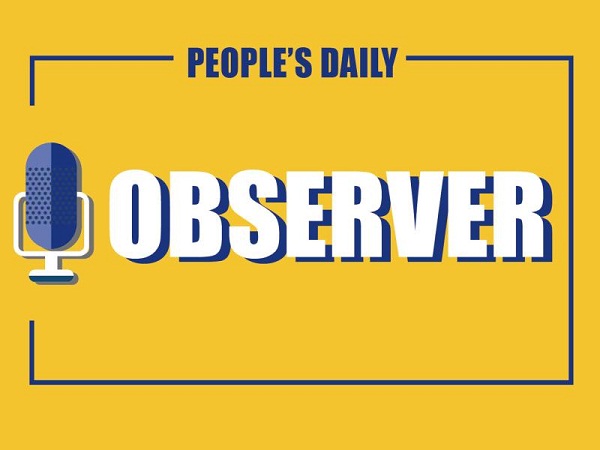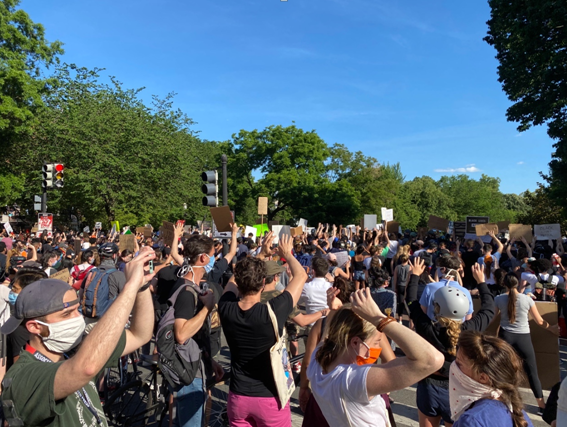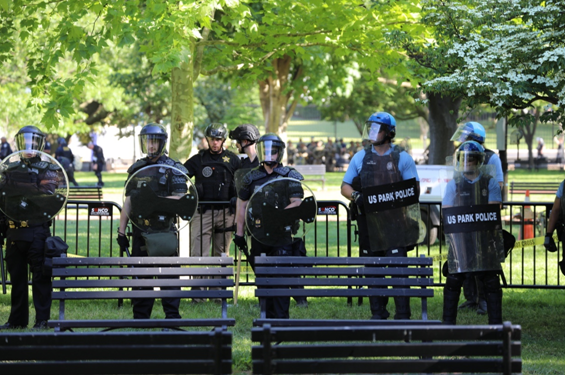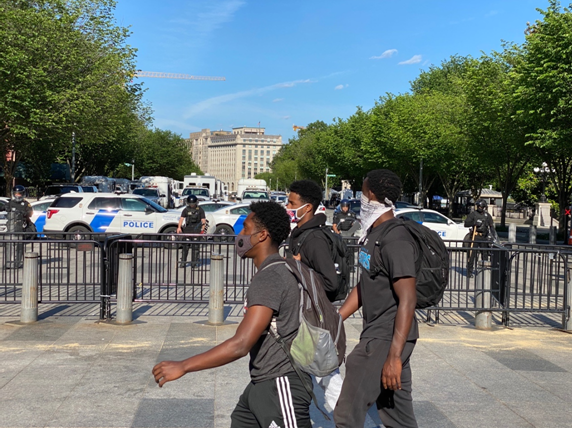
As dual crises confront America at the same time, the country's longstanding systemic problems are becoming harder to hide. For days, protests and riots over the death of George Floyd have been tearing apart the racial scars of American society. Meanwhile, the country is still far from containing the coronavirus outbreak, with more than 24,000 new cases reported on Tuesday.
While the dual crises seem to have been triggered by “accidents,” the country's chronic inaction on some structural issues has clearly affected how they develop.

Photo: Protest over the death of George Floyd in Lafayette Square, Washington DC. /Hu Zexi
In the face of continuing protests against racial injustice, President Donald Trump opted for a tough stance, claiming he’ll unhesitatingly use force to stop the unrest, but he still seems unable to grasp the intensity of the crisis. The protests quickly spread across the nation, a sign of impatience with decades lacking progress on racial issues. It can be seen from the various slogans put forward by the protesters that what they are striving for is nothing more than a basic recognition of the existence of racial problems in American society.
If this is still a battle of political narratives for both parties in Washington, then for many ordinary Americans, it has become a struggle that shape how they view their country and their lives. Today's protests are not only happening in the streets and parks, but also in the hearts and minds of ordinary Americans.
One of my white friends said he does not know how to express his sorrow over the current situation and feels the only thing he can do is to raise his children, a 7-year-old girl and a 5-year-old boy, in a way that they’ll be able to stand up for racial justice. In Arlington County, where I live, the director of the local public library wrote in a letter, saying "It is not enough to share a social media post describing racial injustice or to add an emoji. It is not enough to wait for others to decide what to do to address structural racism."

Photo: Law enforcement officials in Lafayette Square. /Hu Zexi
It should also not be forgotten that African Americans are among the groups hardest hit by the ongoing coronavirus crisis-a group that is dying at a much higher rate than its share of the American population. Various public health analyses suggest that this is closely related to the socio-economic disadvantage that this group has long faced.
The sudden outbreak has exposed some deep flaws in the functioning of the American economy and society. Financial Times’ reporter Rana Foroohar wrote that what she sees in her own neighborhood underscores “how Mr Trump’s fumbling response to coronavirus is part of a bigger national problem.”She noted that “policy choices, made over decades, have relentlessly favored the interests of the private sector in general, and large corporations in particular, over both the state and labour, in ways that are proving costly to our health and our economy”.
Examples of these “bigger national problems” are everywhere. Just think how many people in America can't afford not to go to work for a week. Similarly, there are also large numbers of people in the country who need to think twice before they walk through the door of a hospital.

Photo: Protesters walking near the White House. /Hu Zexi
Adding to the gloom in the face of two crises, the current political climate in Washington simply does not offer room for any solution. Congress can't even agree on how to operate through the pandemic, and Trump is more focused on pandering to his own base. More worryingly, the upcoming election is giving Trump and his aides no qualms about starting more fights, placing the blame on the states, the Democrats, the media and other countries. In other words, over the next five months, the world needs to prepare for a more volatile America.


